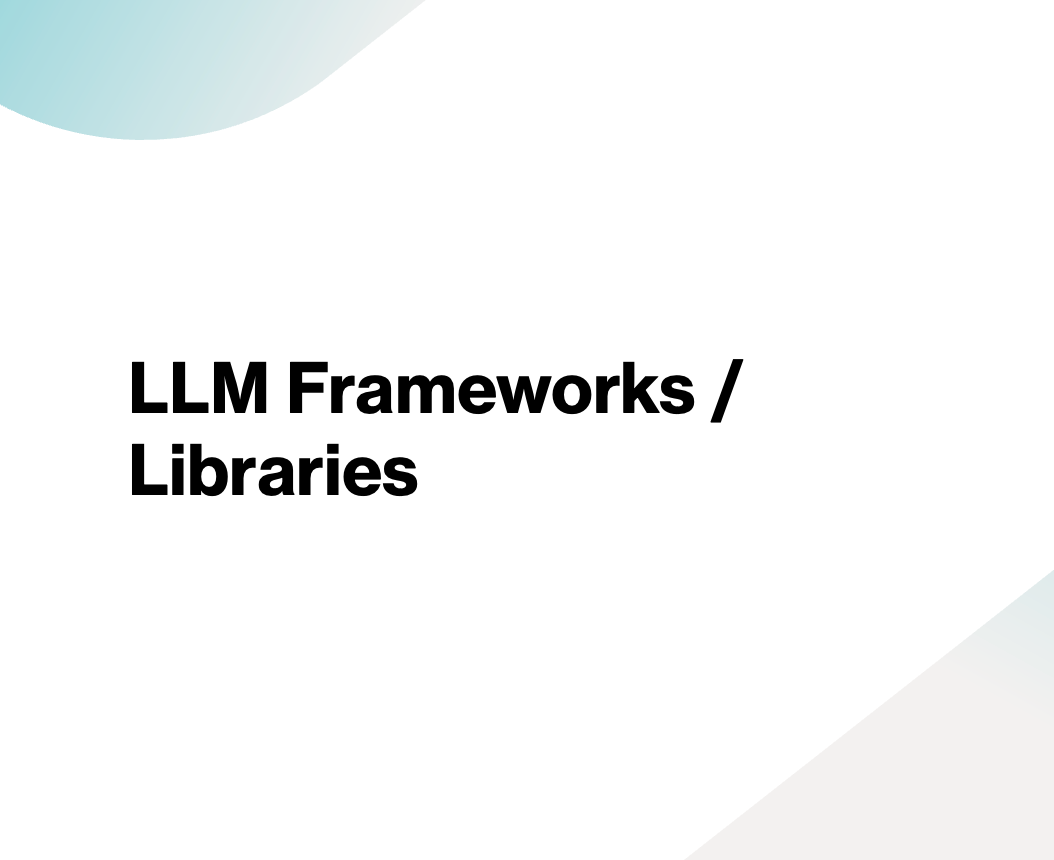In just a few short years, Large Language Models (LLMs) have transformed from cutting-edge research projects into powerful tools that are reshaping how we work, create, and solve problems. Whether you're a developer building the next game-changing app or a business looking to streamline operations, LLMs like GPT-4, Claude, and others have opened up possibilities that seemed like science fiction not long ago.
But here's the thing - while these AI models are incredible, they're also complex beasts to work with. That's where frameworks and libraries come in, acting as your trusty toolbelt for harnessing all that AI power without getting lost in the technical weeds. Let me share some of the most impactful tools that developers are using right now to build amazing things with LLMs.
1. LangChain
LangChain is a popular framework for building advanced applications that integrate LLMs with external data and workflows. It is renowned for its stability and excellent documentation, making it a favorite among developers.
GitHub: LangChain
2. Hugging Face Transformers
This widely-used library provides pre-trained models and a simple interface for transformer-based architectures. Hugging Face has revolutionized access to state-of-the-art LLMs, offering extensive model repositories and tools for customization.
GitHub: Hugging Face Transformers
3. LlamaIndex
An open-source framework for building and evaluating LLMs, LlamaIndex offers developers a comprehensive set of tools for data ingestion, indexing, and evaluation.
GitHub: LlamaIndex
4. PyTorch
A deep learning library known for its dynamic computation graph, PyTorch is highly preferred for building, training, and fine-tuning LLMs. Its flexibility and ease of use have made it a go-to tool for researchers and developers alike.
GitHub: PyTorch
5. DeepEval
DeepEval is a top-rated evaluation framework that provides over 14 LLM evaluation metrics, ensuring your models meet the latest research standards. Its regular updates make it highly reliable for accurate performance assessment.
GitHub: DeepEval
6. Haystack
Haystack offers a simple and efficient way to build and deploy LLM applications. Known for its modular design, it supports retrieval-augmented generation, question-answering pipelines, and more.
GitHub: Haystack
7. TensorFlow
As an open-source machine learning library, TensorFlow provides extensive tools and features for building and training LLMs. It is well-suited for large-scale production-grade deployments.
GitHub: TensorFlow
8. FastAPI
This modern web framework is known for its simplicity and efficiency in building LLM-based applications. Its high performance and scalability make it ideal for deploying AI-powered APIs.
GitHub: FastAPI
9. SpaCy
A cutting-edge natural language processing library, SpaCy provides a wide array of tools and features for building and training LLMs. It is especially valued for its speed and production-readiness.
GitHub: SpaCy
10. MLFlow LLM Evaluate
MLFlow LLM Evaluate simplifies the process of evaluating and comparing the performance of various LLMs, offering developers an easy-to-use interface for testing models under different metrics.
GitHub: MLFlow LLM Evaluate
11. Dify
An open-source platform for creating and managing AI-powered applications, Dify makes deploying AI solutions seamless by integrating data sources and LLM functionalities.
GitHub: Dify
12. LangFlow
LangFlow is a user-friendly interface for designing and deploying LangChain-powered workflows. It simplifies chaining operations and building end-to-end solutions with drag-and-drop capabilities.
GitHub: LangFlow
13. LangWatch
A monitoring and analytics tool, LangWatch provides insights into the performance and behavior of LLM applications in real-time.
GitHub: LangWatch
14. PromptTeams
PromptTeams is a collaborative platform for designing, testing, and optimizing prompts for LLMs, enhancing team productivity.
GitHub: PromptTeams
15. LLMFlows
LLMFlows supports task automation, intelligent agents, and complex decision-making workflows, making it ideal for orchestrating and executing LLM-powered systems.
GitHub: LLMFlows
16. Agenta
Agenta offers collaboration tools for building, managing, and deploying AI-driven workflows. It simplifies model versioning and teamwork in AI projects.
GitHub: Agenta
17. LangFusE
LangFuse provides observability and analytics tools for LLM-based applications. It helps developers monitor, log, and debug interactions with LLMs for better performance and reliability.
GitHub: LangFuse
These frameworks and libraries are at the forefront of LLM development, offering tools to streamline workflows, enhance performance, and enable robust integrations. Explore their repositories to leverage their capabilities for your AI projects!





Which of the frameworks are used to run models localy, and which invoke remote Api call to a provider?